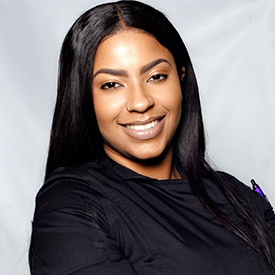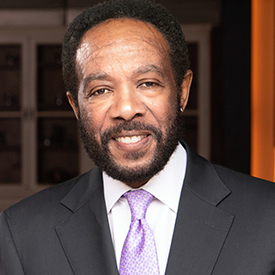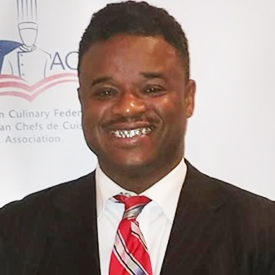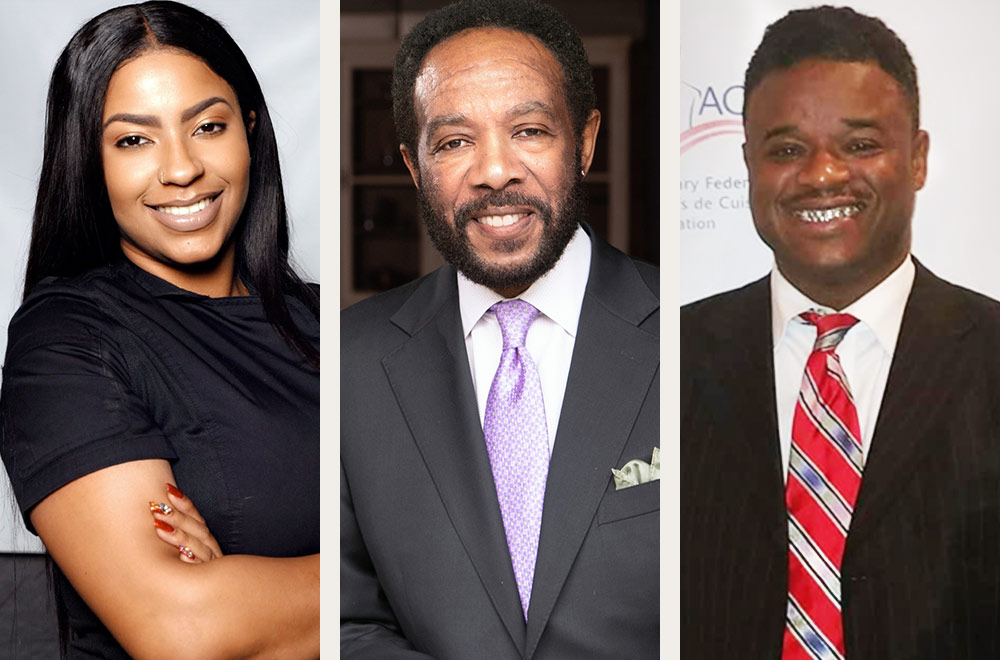The restaurant industry as a whole is an excellent one: scrappy owners risking it all to create customer bliss through deliciously diverse cuisine and immersive ambiance. However, Black restaurant owners can often face challenges that make achieving their dreams and excelling in their profession much more difficult than it should be. At Rewards Network, we support patronization of fantastic Black-owned restaurants across the country, as well as the growth and development of Black businesses and entrepreneurs.
We recently spoke with a few of our Black customers (who own wonderful restaurants) about their candid thoughts on the industry, and the ups and downs of operating a restaurant. We’re confident that everyone can glean some inspiration from these entrepreneurs and help make a difference by supporting Black-owned restaurants.
Blake Cressey
Owner and Chef of Tasty Treat

What inspired you to get into the restaurant industry?
Being an entrepreneur at heart exploring different businesses is what inspired me to go into the restaurant industry. Also, the ability to provide happiness to people. I love seeing the reaction to people enjoying a Tasty Treat meal it’s priceless — this melts my heart.
What has been your favorite part about owning a restaurant?
My favorite part of owning a restaurant is the ability to advance and have many options to expand. I’m also able to create dishes, uniforms, events, and a whole bunch more but most importantly my schedule is my favorite part about owning a restaurant.
What has been the most difficult part about owning a restaurant?
The most difficult part about owning a restaurant is stress and bills, sometimes the stress from the customers and sometime stress from staff. Last but not least the high turnaround. Sometimes it is not anything that you may be doing wrong as a business owner but it’s a part of the industry.
Can you describe any challenges you have faced specifically as a Black restaurant owner?
Restaurants are a tough business, especially in February when capricious weather can damage facilities and slow the flow of diners. Mentorship, access to capital and community wealth are all crucial to a restaurant’s prosperity, but are not equipollent distributed or available to chefs of different races. Though we might cerebrate of institutional racism primarily in terms of access to inculcation or housing, its influence physically contacts all components of our society, including restaurants. Diners can make an incremental but authentic difference by culling ebony-owned restaurants. In Boston, with our high racial segregation in neighborhoods and schools, and our reputation as a racist city with an unsightly history, making this kind of change should be a priority. Ebony-owned businesses are more liable to hire ebony employees than white-owned businesses. Seeking out and fortifying those businesses in particular is a viable path to lowering the disproportionately high ebony unemployment rate. Higher employment, in turn, leads to more and better opportunities for asset and wealth-building for both business owners and their employees, and comes with a host of other community benefits.
Who has been your inspiration for success in your career and why?
My inspiration in life are my kids, Paris and Corey. Having my kids while being young I knew it was something I had to do for them. I had to own a business, I don’t want to miss any moments with my kids, I needed freedom, and not a 40+ hour a week obligation.
What advice would you give to aspiring Black entrepreneurs?
The advice that I will give to aspiring Black entrepreneurs is to continue to stay focused and keep God first. Don’t stop get it get.
Michael LeBlanc
Owner of PLāYT

What inspired you to get into the restaurant industry?
I was/am determined to change the paradigm of what a Black-owned restaurant could look like.
As a Senior Executive for a Fortune 500 company I traveled around the world for years. I dined at some of the best dining establishments in the world…New York, Paris, London, Hong Kong, Sydney, Melbourne, Singapore, Beijing, Tokyo, Seoul, Dublin, Glasgow, Nice, Frankfurt, Amsterdam, Kuala Lumpur, Jakarta, San Francisco, New Orleans; just to name a few.
Some of the dishes that I had were to die for, the settings, the views, the service; jaw dropping; the wine selection would make you go broke.
But, not one had the combination of my favorite food, a nice setting, with the music that I like. I prefer Southern food. I like an upscale elegant environment. But it has to be hip. Beethoven is great but give me Motown and Miles.
I wanted to lick my fingers, have a $120 bottle of wine or a Hurricane, dress stylish, and bob my head to Marvin…in a really nice looking and appointed place with excellent service — one that celebrates Black culture in a refined way.
If there is any part of this that you miss, then you know why I got into the industry. I needed to create a place that I wanted to take my wife to on a Saturday night and bring friends to when they came to town. I’ve eaten around the world and all of these places were celebrated for their cultural food, their fusion, their authenticity.
I was puzzled and had a question, “Why wasn’t Southern food recognized and elevated to ‘cuisine’ or fine dining?”
The answer was the setting, the service, the ambiance, and the flair. Rarely were these attributes combined in the appropriate balance. That became my mission and journey. You have to take a peek at my life…a bit of a journey that eventually comes together to me opening a restaurant.
I was born and raised in New Orleans. I loved being raised there…a City that celebrates partying, drinking, and food. That’s the real Holy Trinity! When I went away to go to college I enjoyed the food in North Carolina, but it was different. When I went to Pittsburgh for graduate school, that food was different, but not as enjoyable as North Carolina and NOLA. Then, I moved to Boston for 20-plus years.
Lobster was good but it wasn’t crawfish. Scrod, whatever that was, wasn’t even close to catfish. And on top of that, I couldn’t find catfish. Now the steak and onion sandwiches, (subs, grinders, hoagies) they were amazing and gave hot sausage sandwiches a run for the money. Boston had Prince Spaghetti Day. Cool, but NOLA had red beans and rice on Mondays. “Lobstah bisque” and “clam chowdah” made me a fan. Yet gumbo is at the TOP of the food chain!
As I mentioned earlier, in my corporate capacity I had functional responsibilities that spanned the entire US. I had numerous European assignments and extended stays in Ireland and Scotland. I lived four years in Hong Kong before returning to the US. Upon repatriating, I decided to live where I wanted to and become an entrepreneur. Those travels made me realize that I was a true Son of the South. Nothing beats Southern Cooking.
I am a business person at heart. I never really thought about owning a restaurant. However, I did work in one of North Carolina’s most expensive restaurants as a waiter in college. My roommates and I were the first Black waiters.
In summary, to have guests live just a little bit of the joyful experiences I had in my life’s journey — a special ambiance with Southern food, soulful music, and a nuanced type of partying — bringing all of the different geographies, cultures, and socio-economic groups together in a gumbo of epicurean offerings, while at the same time bringing diverse clientele together, all interconnected through a Black welcoming cultural experience was my inspiration and is my mission.
Everyone had to get…a taste of the South!!!
What has been your favorite part about owning a restaurant?
Looking out and seeing a clientele that is diverse and valuing those differences as opposed to seeking homogenization. I like seeing the pride that Black folks have because of the ambiance of elegance and charm at my establishment. I love hearing the City officials and neighborhoods claiming the restaurant as theirs, no matter what ethnicity. I love the “family” that’s been created with the staff. I love observing guests and seeing that split second of “awe.”
What has been the most difficult part about owning a restaurant?
That’s easy…not making money, putting in long hours, being away from my wife and family, babysitting the staff, fighting frivolous nuisance suits, constant emergencies, equipment breaking down…did I say that I loved this?
Can you describe any challenges you have faced specifically as a Black restaurant owner?
Access to capital (institutional, equity, or angel). Stereotyping across the board.
Who has been your inspiration for success in your career and why?
Jackie Robinson…to do what he did, when he did it, how he carried himself when baseball was at its pinnacle in the American lexicon was nothing short of amazing…strength of character, integrity, courage, persistence, and talent.
Muhammad Ali…talented, brash, not humble, showmanship, principled, committed.
Reginald Lewis…a real deal maker, confident, classy, overachiever, circumstances didn’t matter. He created a path.
Black mothers…no stronger people on Earth…constantly have faced and overcome insurmountable odds; our glue, nurturers, providers, protectors, beautiful, disenfranchised, disrespected, raped…and still they rise!
What advice would you give to aspiring Black entrepreneurs?
Become You, Inc.
Create a vision. Establish milestones. Understand finances and cash flow. Watch the money daily. Learn the details. Be decisive and don’t look back. Network within the Black community. Network cross-culturally. Develop an Advisory Board. Join organizations. Form a relationship with both financially successful people and those that tried but gave up their dream. Be persistent. Read within your industry. Meet people in your space. Have fun. Take time off. Include your significant other.
Omar Mitchell
Owner and Chef of Table No. 2

What inspired you to get into the restaurant industry?
This is exactly what I went to school for at Johnson & Wales University Culinary Arts in Providence, Rhode Island.
What has been your favorite part about owning a restaurant?
My favorite part of owning my restaurant is the wide range of creativity without being handcuffed to someone else’s goals or restrictions, complete freedom to your vision.
What has been the most difficult part about owning a restaurant?
Being able to survive eight months of road construction in front of the building and Covid-19 breakout were my most difficult challenges.
Can you describe any challenges you have faced specifically as a Black restaurant owner?
Not being considered to be a solid candidate without being judged or profiled. Also, not being invited to participate in bids or future jobs with the big boys, even if you have more experience than them.
Who has been your inspiration for success in your career and why?
My inspiration would be my family and the Black and Brown community by hopefully being a role model and great example on how to demonstrate what to do and what not to do for success in America.
What advice would you give to aspiring Black entrepreneurs?
Don’t quit your job until you’re financially stable. Keep pushing you’re going to get more “no” answers than “yes” answers. Dream big but be realistic — grow with your sales. Never show what your thoughts are until it’s completely ready for sale. Finally, don’t put the cart before the horse (meaning don’t buy the luxury things until you’re financially ready — you never want to compete with the Joneses).
The restaurant industry is an unpredictable scene even on a good day, but now much more so, due to the coronavirus pandemic. COVID-19 continues to disproportionately affect Black Americans and Black-owned businesses. It’s vital to show your support for the Black community by consistently putting your money behind your favorite local Black-owned restaurants and businesses. We thank Omar Mitchell, Michael LeBlanc, and Blake Cressey for their time and insight into the challenges and nuances of being a Black restaurant owner.
Be sure to regularly visit our free resources section dedicated to advising restaurants on how to navigate the changing rules and regulations during the COVID-19 pandemic.






